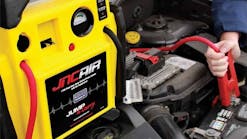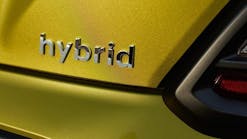Big data could be a big problem for repair shops
When it comes to competition, you’ve always looked down the street at the nearest independent shops. Of course, service departments at dealerships are technically competitors, too. But after a warranty expires on a vehicle, car owners can be separated into two categories: those who continue to go to the dealership for service and those who become customers of independent shops. You and the shops down the street have always competed for that second kind of customer.
If you look down the road and into the future, it’s not hard to see that dealerships are in a position to threaten your business in a much more significant way than any other independent shop. In fact, your current competition could soon become an ally, since they’re in the same position.
So what’s the big threat? The OBD port. More specifically, the data that flows from that port.
It’s easy to forget there’s really only one reason OBD ports are absolutely necessary: to provide emissions data. That’s it. That’s the only information the government requires OEMs to share, and they do it through the OBD. Obviously, most manufacturers provide dozens (if not hundreds) of other data points through the OBD, but it’s not a requirement—and that should make you pay attention to how OEMs are responding to what’s called the internet of things (IoT), or as we’ll get into in a minute, the internet of cars (IoC).
If you’re unfamiliar with the IoT, it’s a pretty simple concept: anything that’s computerized and communicates over the internet is part of the IoT. Today, that includes many household appliances, from thermostats to refrigerators to coffee makers to light bulbs. If your Mr. Coffee isn’t currently connected to the internet, it won’t be long. Manufacturers of everyday household items are connecting their devices to the Internet so they can collect and use data, as well as upgrade those devices from afar.
The same thing is happening with vehicle computer systems. The industry refers to them as “connected cars”. These cars are in almost constant communication with the OEM. They relay all kinds of data, including the kind of data that you receive from plugging into a vehicle’s OBD. So what’s the big deal?
Currently, cars turn on a light to warn a driver the vehicle is approaching its maximum oil life. When the driver gets the warning, they can make an appointment for an oil change. No big deal. But what if there was more than just a warning light? What if the car flashed the light then immediately offered a discounted oil change at a dealership’s service center? What if it even made an appointment for the driver at the time? If they accept the car’s offer, it’s money out of your pocket. But at least the driver still has a choice. They can still choose your shop.
Now imagine a warning light for an engine malfunction. It’s time for the driver to head to their favorite repair shop to get a more in-depth diagnosis, right? Not so fast. What if the malfunction was computer-related? There are two scenarios for this event that should make you take notice. First, an OEM could send a patch to the computer and immediately fix the problem, which allows the car to avoid a trip to its local service shop. Second, if a problem can’t be fixed on the fly and a shop visit is necessary, the OEM could still force that car into one of its dealership service centers by shutting off the data flow from the OBD. We’ll repeat that: the dealership could deny your shop access to the necessary data to perform the repair.
Currently, there’s nothing that can stop this. If an auto manufacturer doesn’t want to give independent shops access to the vehicle data, it’s not mandatory (except in the case of emissions). Thankfully, they don’t do this. In part, it’s because service centers at dealers simply couldn’t handle the volume of repairs and the OEMs would face a revolt from vehicle owners. Another reason: they face pressure from shop owners like you.
It’s time to pay attention to both how OEMs are talking about sharing the data and how industry organizations are preparing to fight for independent shops like yours. A recent Quartz article lays out the two potential standards that are currently being considered:
The first keeps the data in the possession of the manufacturers by storing it in the cloud on their own servers. To access that data, repair shops would license it through an agreement with the OEMs, which would mean you’d incur an expense you currently don’t have.
The second would keep the data on the car instead of in the cloud. Then, repair shops would register with an industry-related third party in order to verify they needed access to the data. Essentially, the car would own the data, not the manufacturer of the car.
It’s an important situation that requires your attention, if not your voice. Watch for updates as the situation progresses.
Information provided by: Rotary Lift


